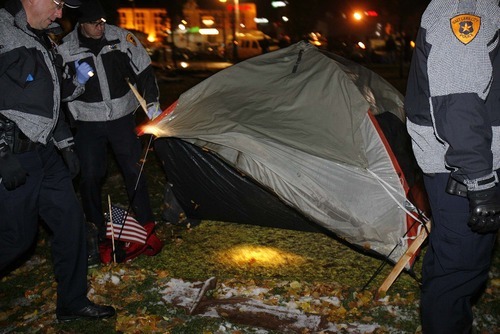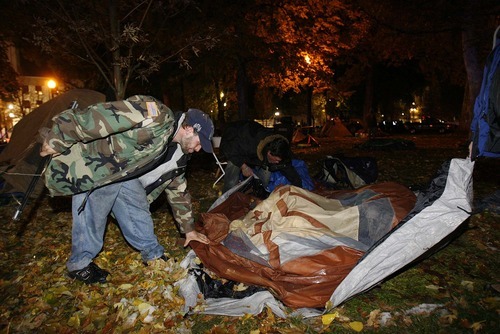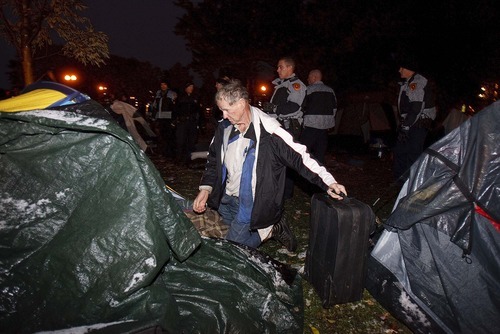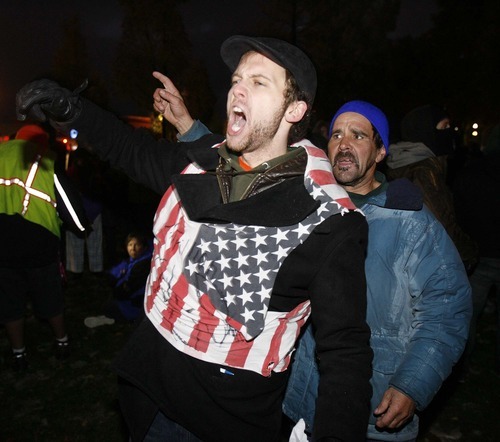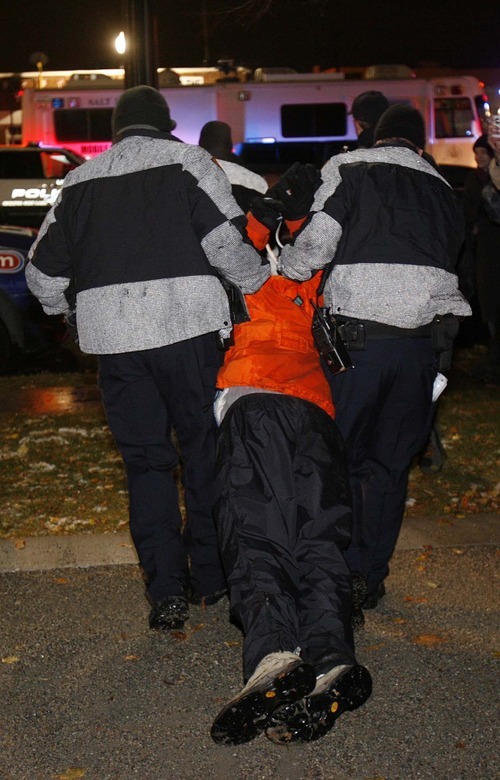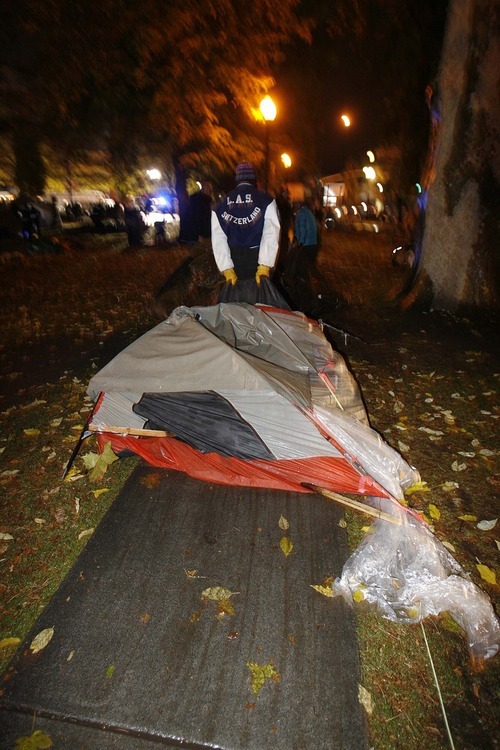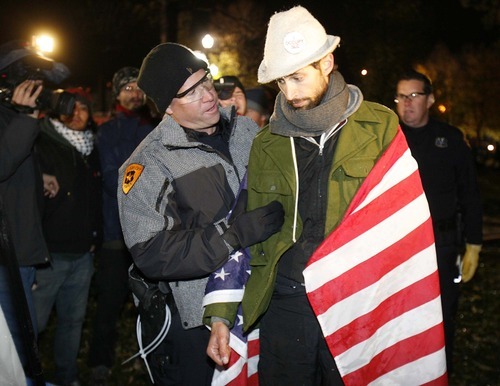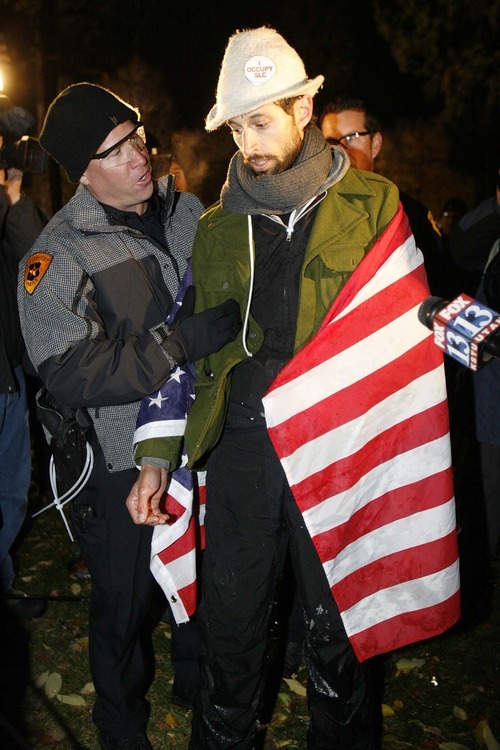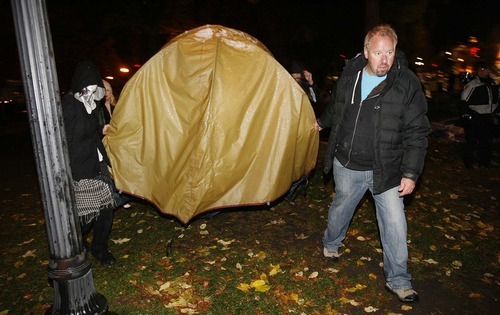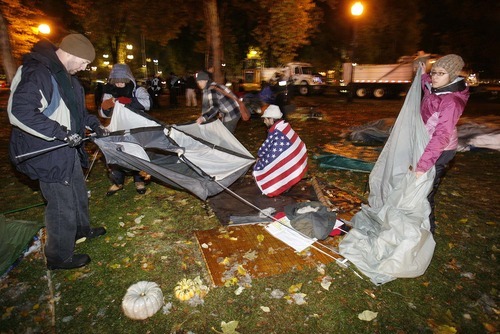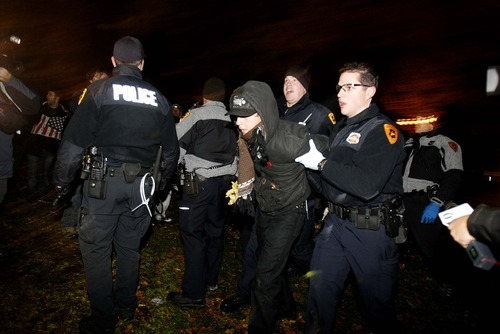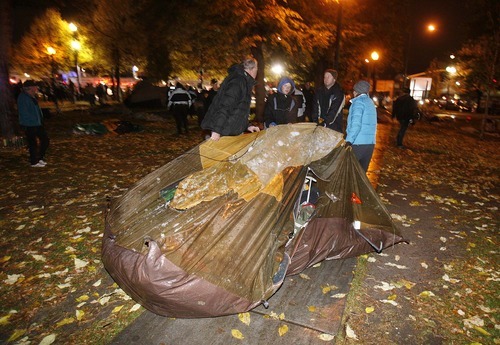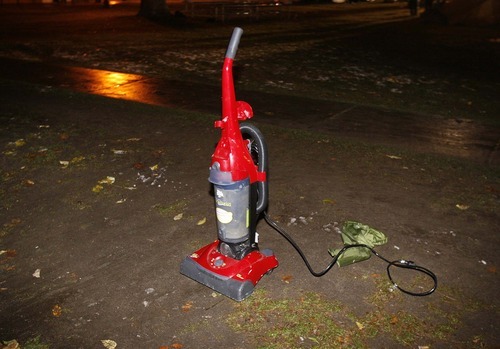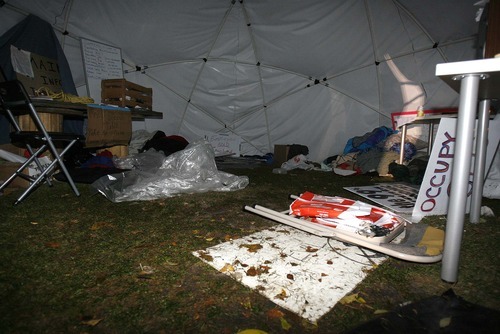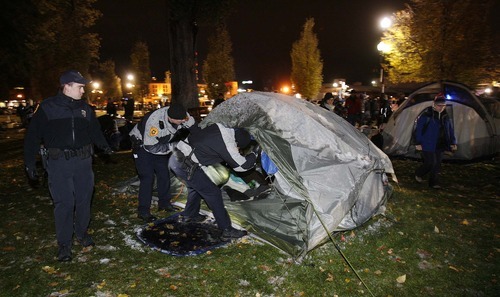This is an archived article that was published on sltrib.com in 2011, and information in the article may be outdated. It is provided only for personal research purposes and may not be reprinted.
Salt Lake City kept its word Saturday, clearing the Occupy SLC campsite at Pioneer Park, and the Occupiers kept to their principles, vacating the park — whether of their own accord or in handcuffs — nonviolently.
There was a small police presence in the park for most of day as officers told people they would have to eventually leave and directing them to homeless shelters where they could stay for the night. Salt Lake City Police Chief Chris Burbank arrived in the early afternoon.
"We're here to assist," Burbank told Occupiers, explaining protesters would be allowed to leave two tents at the park for day use. "I know this isn't what you wanted, what you desire. If you choose to refuse to leave, we ask that you have somebody secure your stuff."
Meanwhile, the Occupiers had a series of meetings throughout the day to develop a strategy for reacting to the impending police sweep.
"Nobody knew how the cops were going to react," said Allen Langdale, who had been living in a motel room before joining the Occupation once it set up at Pioneer Park. "We kept teaching people today in the park — no violence. That's the only way the general public is going to continue to support us."
About 5:30 p.m., a massive fleet of police vehicles arrived at the south end of the park, carrying more than 70 officers from the city as well as from the county's Unified Police Department. About an hour later, as an officer addressed the crowd through a bullhorn, other officers waving flashlights began shaking down tents, which looked like deflating balloons.
"It's a difficult situation, and my goal is to accomplish it peacefully," Burbank told about 100 people at the park, who included Occupiers, the park's homeless residents, observers and reporters. "We want to get this accomplished tonight. Right now, it's just facilitating movement of a lot of people. At some point, we will say absolutely, 'It's time to leave.' "
Police directed campers to gather their belongings while offering to help protesters find places to stay overnight. Officers first swept the east side of the park, as protesters gathered around them, and by 5:47 p.m., police began clearing tents on the west side.
Sanitation workers then moved in with a front-end loader and two dump trucks to clear debris from the campsite locations.
"This is what a police state looks like," said protester Drew Baker, 21, who led others in a chant.
The city's order to vacate the park was handed down Friday, just hours after a homeless man was found dead in a tent, apparently because of carbon monoxide poisoning and a drug overdose.
It was a consensus decision by Salt Lake City Mayor Ralph Becker and officials from the police, parks, public works and other agencies, said Becker's spokesman, Art Raymond.
Three main Occupy SLC organizers were arrested around 7 p.m. while attempting to re-erect a tent after officers had cleared the tent village.
Jesse Fruhwirth, Michael Wilson and Rachel Carter moved to the southeast corner of the park and began pitching a blue tent. Officers immediately apprehended and handcuffed the trio. As they were led to a police van, park protesters shouted: "Thank you, Jesse." "Thank you, Michael." "Thank you, Rachel."
The organizers' resistance was the closest thing to a standoff in the 90 minutes since the sweep had begun. That may have been due to the strategy Occupiers had adopted.
Langdale said the protesters had agreed to not be arrested en masse, but to let the police take them into custody one-by-one, so as to not raise emotions.
"Once they figured out we weren't going to throw bricks and rocks and stuff, they were very nice about it," Langdale said of the police.
As he watched city crews scooping up debris near his campsite, Langdale found a reason to be content about the 38-day Occupation of Pioneer Park.
"It's shown the world it can be done nonviolently," he said.
By the end of the sweep around 8 p.m., 18 people had been arrested and one person received a citation, police said. The majority of those arrested face misdemeanor charges.
Deb Henry, one of the Occupiers, was glad that there wasn't any violence during the police sweep.
"You have to give [Burbank] a decent amount of credit for that," she said from the sidewalk on the edge of the park, where police directed people who had been in the park during the sweep.
Around 7:30 p.m., Burbank announced that the corner of 400 West and 400 South across the street from the park had been designated as a free-speech zone. He said people could protest there throughout the night, but that no camping would be allowed. By 10 p.m. as temperatures dipped to 36 degrees, all the protesters had seemingly disappeared. None chose to occupy the corner allowed by the city.
Burbank said officers found "deplorable" conditions that created biological hazards at the camp. Inside a lot of tents, he said officers found soiled toilet paper, feces, urine — all left behind by people who used their sleeping areas as bathrooms. He said police also found drug paraphernalia. It was so bad, some of the tents were left unclaimed, he said.
"It was actually much worse than I had anticipated," he said, noting those conditions helped reinforce the city's decision to prohibit camping and to close the camp.
John Netto, a homeless advocate, advised campers during the sweep that two trucks and two limousines would be arriving to transfer their belongings to his Murray warehouse. "I'm trying to help decompress the situation a little bit."
One limo was used to transport six people to the Occupy Ogden camp.
Most of the Occupiers and homeless were gone from the area by 8:30 p.m.
Not everyone was impressed with the way the police sweep played out Saturday.
City Councilman Soren Simonsen said he had come down to observe the police action.
"I'm a little bit disappointed with the heavy-handedness of moving people out of the park tonight," he said, calling the move extremely reactionary considering the man's death wasn't connected to the Occupiers' actions.
Simonsen, who supports the Occupy Movement, said he hopes in the coming days there would be a discussion about allowing the movement to have a place to deliver its message.
Stewart Gollan, an attorney with the Utah Legal Clinic, said the sweep was an invasive response to events that could have been addressed in other ways while allowing the free-speech movement at the park to continue.
"I'm glad there was no violence," he said.
One bystander, Peggy Wilson, said she came to the park just to observe. She doesn't support the Occupy SLC protest, she said, or police brutality, although she hadn't observed any evidence of that.
"I'm infuriated they are having to use this amount of taxpayer money to baby-sit this cause, instead of using it to provide real shelter to real homeless people," she said.
Meanwhile, earlier in the afternoon, four blocks east at Gallivan Center, an offshoot group of protesters milled around five tents, which had been set up since they received a protest permit on Wednesday. "We are planning on staying," said Heather Suker, known as the group's "Mama bear." "We have no plans to leave. If they pull our permit, we aren't going to stop."
Police said no camping would be allowed at any of the protest sites, but had no plans Saturday night to remove anyone from Gallivan Center.
Earlier in the day, before police arrived at Pioneer Park, Volunteers of America staff began going tent-to-tent at Pioneer Park with plastic bags, urging protestors and the park's homeless residents to pack up and clear out.
The Catholic Community Services' Weigand Center day shelter was open later, while The Road Home shelter opened earlier than usual to accommodate people leaving the park, according to Kathy Bray, VOA chief executive officer.
"We're trying to help people to pack up their personal belongings before the police come, and trying to work with them on what they're going to do for shelter tonight," she said. "We don't want the homeless to be arrested. That might end with them losing all the personal belongings they have."
Cimaron Neugebauer and Janelle Stecklein contributed to this story.


